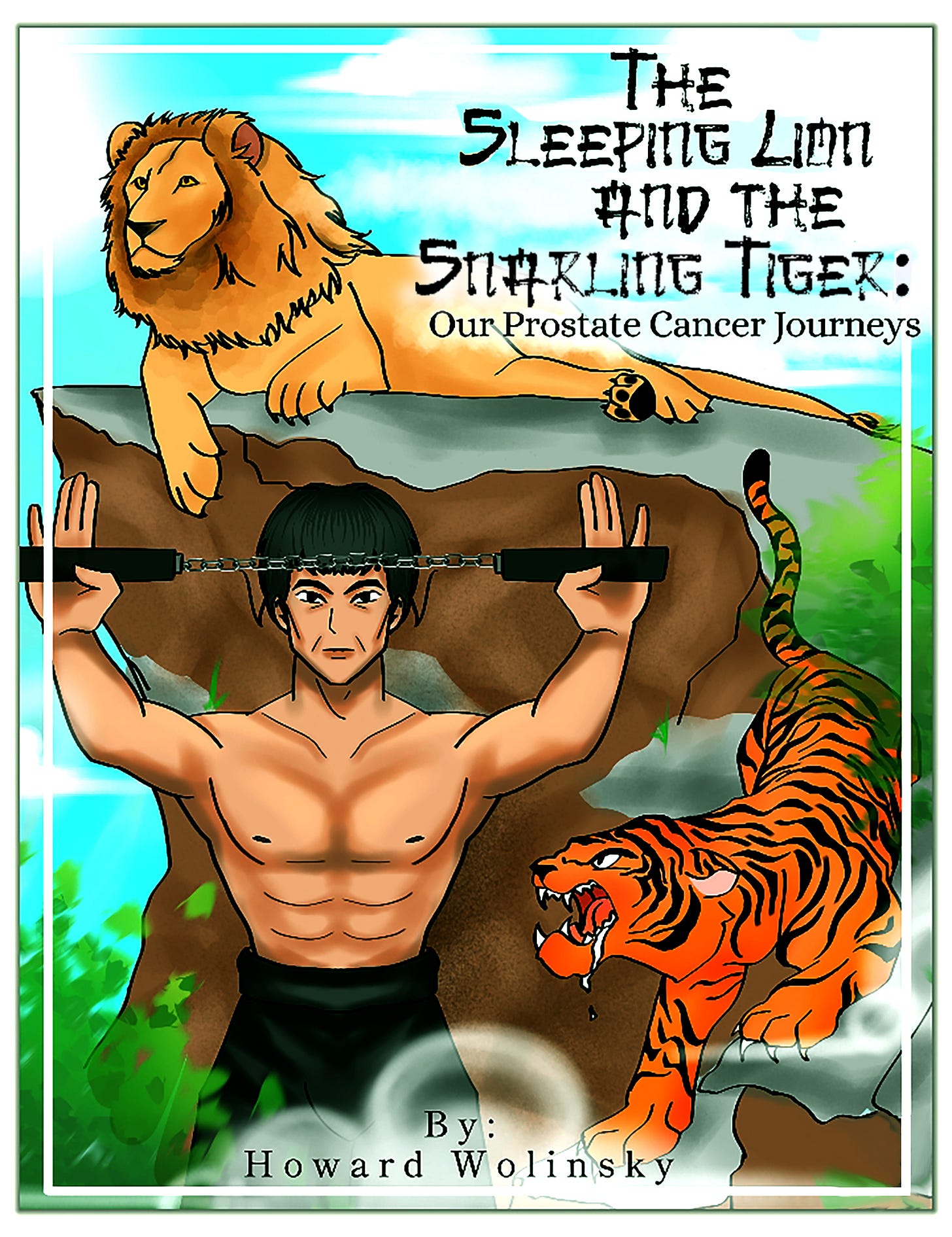The Sleeping Lion and The Snarling Tiger: Our Prostate Cancer Journeys
Join the Prostate Cancer Book Club--if Oprah can do it, we can, too
By Howard Wolinsky
I remember a cartoon I saw years ago. It shows a guy retching, twisted into a pretzel, and pulling a book from his mouth. The caption said: “Everyone has a book in them.”
I believe it’s true.
I have written five books. All topics were medical. Two were ghosted. And three were commercially published. One was a best-seller, “Healthcare Online For Dummies” with my librarian wife Judi Wolinsky—for a week.
On September 6, 2001, the book made the best-seller list. Five days later, the country was overcome by the attack on the Twin Towers. I wasn’t in a mood to do a hard sell.
I still rightfully can claim to be a best-selling author.
I have had bad luck with books. My first, with co-author with my Chicago Sun-Times colleague, Tom Brune, was “The Serpent on the Staff: The Unhealthy Politics of the American Medical Association.”
We had shaken up the AMA with various scandals that led to its long-time CEO resigning accompanied by seven other top execs. (The Sun-Times nominated our work twice for the Pulitzer Prize. No cigar, but still nice.)
Tom and I had a book signing on June 17, 1994—the night of O. J. Simpson’s infamous slow chase. We chased O.J. for the next two years.
My latest book is “Contain and Eliminate: The AMA’s Conspiracy to Destroy Chiropractic.” It’s a tale of espionage, break-ins, infiltrations, the biggest FBI raid in its history, and a little bit of witness protection plus a 14-year legal battle that reached its conclusion in the U.S. Supreme Court,
What went wrong with my book this time? COVID-19.
The publisher’s staff stayed away from work for months in 2021 to avoid getting sick. I don’t blame them. When they finally were ready, the British-made press broke down.
I was informed that the “sewer” had broken. Not the kind that carries sewage. But a device to sew the book binding.
Talk about being in a bind. Try to find an exotic part in the midst of a pandemic.
The book was delayed a year.
Despite all the headaches, early in the pandemic, I considered writing a book on active surveillance for low-risk prostate cancer.
I debated whether it would be a first-person story of coping with low-risk prostate cancer, or maybe a guidebook co-written with a prominent physician.
I came up with a title: “The Sleeping Lion and The Snarling Tiger: Our Prostate Cancer Journeys.”
I thought the title sounded like a Bruce Lee movie. So I had an artist in Pakistan do a mock-up as a gag.
There are metaphors for prostate cancer. Low-risk prostate cancer has been referred to as a turtle because it is slow-moving (growing) while more advanced cancer is referred to as a rabbit or bird because it is fast-moving.
But I liked the analogy of the Sleeping Lion vs. the Snarling Tiger.
In the end, I decided to drop the project. Prostate cancer care itself is a fast-moving target. I felt I couldn’t keep up with a book. Instead, I decided to do this newsletter, TheActiveSurveillor.com
Please let me know what you think of the book idea in the comment bubble. How much would you pay for a book on AS? Would you even want one?
Meanwhile, join the Prostate Cancer Book Club:
Please write a review of your favorite prostate cancer book
By Howard Wolinsky
Patients always seem to be looking for books about prostate cancer. There is a library of them available—though none I am aware of about active surveillance.
If you found a book you like, or don’t like, please review it for TheActiveSurveillor.com and help out other patients.
Contact me in the comments with the book you want to review and your email address. Pat Walsh, Gerry Chodak, and more have MD books on the prostate. What did you learn?
Keep it short. Or as long as you wish.
I can use your name or you can be anonymous.
Our first review runs below. Victor is a retired senior tech executive.
By Victor W.
Michael Korda is a well-known writer and was the Editor-in-Chief of Simon & Schuster Publishing company for many years before retiring in the early 2000s. He wrote a number of books about history and biography, including the recounting of his medical experience in the “Man to Man: Surviving Prostate Cancer”.
This book is much acclaimed. Reviewers said: ”A frank, moving, exceptionally well-written account by a prostate cancer survivor brave enough to write freely about the disease” and Korda “…. writes as no one else has. An important book, one that should be in the waiting rooms of urology practices.”
“Man to Man” is an old book, nearly 30 years ago. Some of the treatment decisions then are now generally considered wrong, such as radical prostatectomy for a Gleason 6 diagnosis. There was no MRI imaging or genomic testing available.
Korda did his research to explore radiation therapy and included in the last chapter his joining the country’s first prostate cancer support group in New York, where he reported the seething anger and regrets of some folks having serious side effects after their treatment.
Korda’s storytelling of the diagnosis, treatment modality decisions, logistical and emotional impacts upon the patient and his family, and the aftermath is mostly the same as now.
I want to hear and learn more from our support group about the suffering, pains, regrets, and scars of those who decided to have treatment either through surgery, radiation, or other means.
Would it be wise to delay treatments as long as possible (and then longer) to wait for better therapeutic advancements such as those of dostarlimab, an experimental drug studied at New York’s Memorial Sloan Kettering Cancer Center. A small (18) number of rectal cancer patients seemingly experienced a complete “medical miracle.” Their cancers simply vanished after six months of treatment.
Would it be too risky to allow the cancer to metastasize to a much more dangerous and incurable stage? These are complicated and difficult questions.
I am hopeful that each of us will continue to learn about prostate cancer, to be our own advocates, and be aware that doctors do not know it all. Also, be optimistic and never give up, just like the heroic exhortations by Korda throughout his book.
Don’t miss the ASPI webinar, “Eat to Beat Prostate Disease,” on July 30 at 12-1:30 PM Eastern, featuring William Li, MD.
Free Registration: www.aspatients.org or go direct to: https://bit.ly/3t5lFLx
Free prostate-healthy recipes for all registrants.
Moderator: David King Keller, PhD, prostate cancer patient, author, inventor.
Also, check out the AnCan webinar, “Genetic and Genomic Testing - The How's, Why's and Where's” at 8-9:30 pm Eastern June 29. Register: https://bit.ly/3QiNvxS







John L. Gore, M.D., MS at University of Washington Medicine recently made the following comment before a local PCa support group which SHOULD BE the annual mantra each year at the A.U.A. annual national meeting-and I paraphrase-"Show me reason, Mr. Cancer, WHY I should intervene!
Over the years I've collected a number of books concerning prostate cancer and even written forwards for a couple. However, there are 2 books that all men and partners should read on this subject. Along with many supporting references, these books lay bare the unbridled fraud in the prostate cancer arena - tests and treatments that result only in the harm of countless men.
The Rise and Fall of the Prostate Cancer Scam - by Anthony Horan MD - he has other books
The Great Prostate Hoax - by R. Ablin PhD and R. Piana PhD